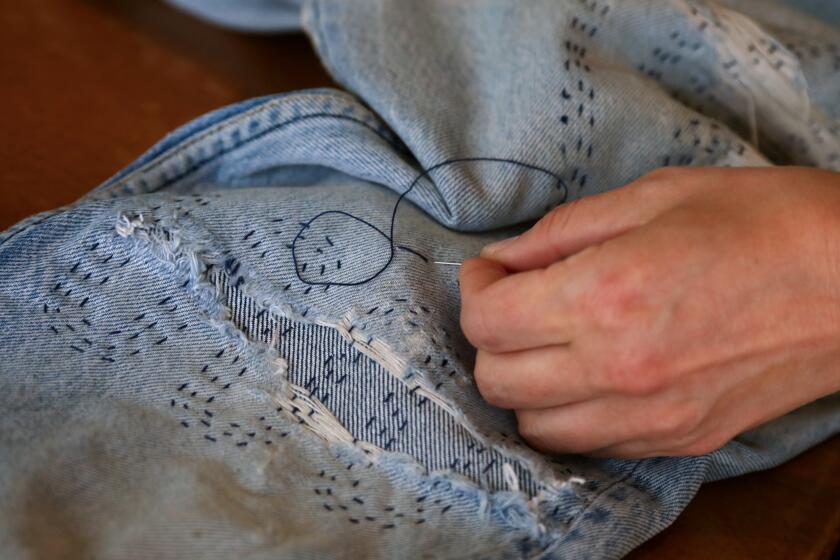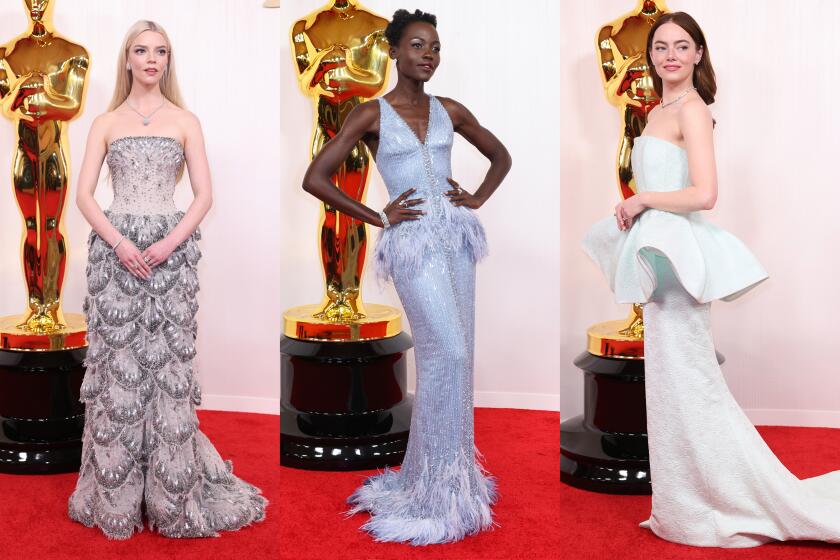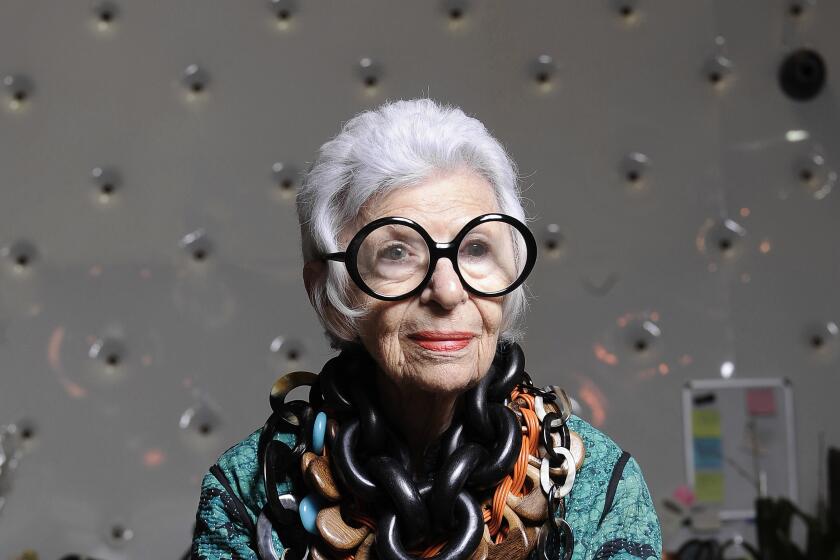Patagonia’s Founder Seeks to Spread Environmental Gospel
Yvon Chouinard has climbed a glacier on the face of Mt. Kenya, survived an avalanche on Minya Konka in Tibet and kayaked down the Yellowstone River through a treacherous rock wall canyon. He has also helped preserve millions of acres of wild lands in the U.S. and South America -- all this on top of building an outdoor apparel business with $240 million in sales.
But the founder and chairman of Ventura-based Patagonia Inc. is now facing what could be his biggest challenge: convincing corporate America that environmental awareness can be a profitable business model.
Chouinard has a new book, “Let My People Go Surfing: The Education of a Reluctant Businessman,” which describes the pitfalls of growing a business too fast and the perils of polluting. In a nutshell, he wants people to think first about the planet.
It is, he admits, “a hard sell.”
The 66-year-old Chouinard -- who backed into a career when he began making climbing tools almost 50 years ago -- isn’t brimming with optimism. “I’m very pessimistic about the future,” he said during a recent interview at his Ventura office. “I don’t feel like we’ve had much impact yet.”
Even his own company has a long way to go, he observed ruefully. He noted that he recently paid $2 million to install solar panels over a parking lot -- which is filled with employees’ gas-guzzling SUVs.
He hopes the book, which will be released nationwide Monday, will make a difference.
In it, Chouinard describes how, after working through successes and failures, he began seeing Patagonia as a potential model for other businesses.
Environmental groups and some business leaders say it has done just that.
“Patagonia made a difference because they stood out as a leader in the apparel industry,” said Todd Larsen, managing director of the environmental activist group Co-op America. “They’re a true success story.”
Patagonia’s decision to switch to organic cotton in 1996, for example, prompted other companies to think harder about the materials they used to make clothing.
Chouinard also co-founded 1% for the Planet, an alliance of 175 small businesses that have agreed to give at least that amount of sales to environmental groups.
But business consultant Michael Kami, whom Chouinard sought out for advice more than a decade ago, holds out little hope that others are likely to follow his lead. Although corporate givers are plentiful, few businesses incorporate doing good into their business plan, Kami said. Usually, charitably inclined executives make a killing and then start handing out money.
“He’s very rare,” Kami said.
Observers note that a major reason Chouinard can implement his vision at Patagonia is that the company is, and always has been, privately held. With shareholders watching from the wings, it’s much harder for a publicly held business to follow such a vision.
Chouinard has kept his focus on the environment “at the expense, I’m sure, of major commercial success in growing his company,” said Dick Baker, chief executive of Irvine-based Ocean Pacific Apparel Corp. “He’s a very different animal than virtually all public companies.”
Chouinard is known for his blunt, often downbeat, assessments of the state of the planet and the shortsightedness of corporations. He describes American businesses as “lemmings” and says free trade and globalism are “absolutely killing us.” As for the stock market, it’s “evil,” partly because shareholders get only a sliver of a company’s tangible worth, he says.
So uncompromising is the 5-foot-4-inch-tall Chouinard about his principles that pal Tom Brokaw calls him the “tiny terror.”
The former NBC anchor has known Chouinard for 20 years; the two have climbed Mt. Rainier and the Grand Tetons together. As Brokaw sees it, Chouinard and the outdoors are inextricably linked. “It’s his whole world,” Brokaw said.
Said Baker, “He is an eco-warrior in its purest sense.
“Does he piss people off? Absolutely. But he’s been doing that for 30 years.”
From the outset, Yvon Chouinard didn’t seem destined for business success.
Born in Maine, he got his Gallic name from his father, a French Canadian from Quebec. As a child, Chouinard was bored by school, developed an “attitude” and hung out with “fellow misfits,” his book says. As a young outdoorsman, he considered politicians and businessmen “greaseballs” and viewed corporations “as the source of all evil.”
But he became an entrepreneur in spite of himself, to make better climbing tools.
Chouinard’s father helped him build his first shop in 1957 out of an old chicken coop in the backyard of their home in Burbank, according to the book. In 1966, he moved to Ventura to be closer to the surf, setting up shop in a tin boiler room of an abandoned slaughterhouse.
In the late 1960s, Chouinard Equipment Co. added clothing to its product mix, a line that eventually was dubbed Patagonia and became a separate apparel company.
Chouinard took an environmental stand early, providing a little money and work space for Friends of the Ventura River and, in 1985, pledging 10% of pretax profit to environmental groups. (In 1992, that was changed to 1% of total sales or 10% of pretax profit, whichever is greater.)
The first major crisis occurred in the late 1980s, when Chouinard Equipment was hit with several lawsuits claiming that the company provided improper safety warnings with its gear. The lawsuits were settled out of court, and the company’s insurance premiums shot up 2,000% in a year, prompting Chouinard Equipment to file for Chapter 11 bankruptcy protection in 1989, Chouinard said.
Employees bought the assets and moved the restructured company, Black Diamond Equipment Ltd., to Salt Lake City in 1991.
Meanwhile, soul-searching was underway at Patagonia as the company began to see its rapid growth as “unsustainable” and in conflict with its principles.
“Had we kept growing at that rate, we would have been a $1-billion company in no time at all,” Chouinard said. The company would have had to sell to department stores and ultimately to discounters, he said, driving down prices and quality. “That would have negated everything we were in business for.”
That year, as the nation entered a recession, Patagonia -- struggling with distribution and other problems -- hit a wall. Dealers canceled orders, and the bank cut Patagonia’s credit line. On July 31 -- the “darkest day in the company’s history,” according to the book -- the company laid off 120 workers, about 20% of the workforce.
After a trip to Argentina, during which Patagonia’s managers took a hard look at the direction of the business, they adopted a values statement. It said the Earth was in peril and vowed that Patagonia would “re-order” its values, making all future decisions “in the context of the environmental crisis,” the book says.
The company took a fresh look at the way it made clothes, and it became the first to make fleece jackets using recycled bottles instead of polyester. It also reined in growth. It currently sells to 700 retailers, many of them small specialty stores. It also sells through its own chain, which comprises about 40 stores in the U.S., Europe, Asia and Chile.
“I could call Nordstrom, maybe tomorrow, and sell I don’t know how many millions of dollars’ worth of stuff,” Chouinard said. “You just have to say no. And that’s what we’re doing here.”
The company banned paper cups and plastic trash-can liners from its offices and built an extension to its headquarters using 95% recycled materials. Children at the company’s day-care center help wheel the cafeteria’s kitchen scraps to the corporate compost heap. Diaper-changing tables are blanketed with used computer paper.
Not that Patagonia claims purity. Chouinard says he’s still a polluter who makes many products using nonrenewable resources. So he’s doing “penance” -- Patagonia has contributed more than $22 million to environmental groups since 1985, Chouinard said, and he and his wife, Malinda, co-owner of the company, also give 30% of their salaries. Royalties from his book also will be donated, he said.
Businesses such as Patagonia are part of a larger movement that was born in the 1970s and have been gathering steam over the last decade, said Jason Mark, California director for the Union of Concerned Scientists, a nonprofit advocacy group that conducts research related to energy and climate changes.
Today, rising energy costs are driving a “new wave of consciousness among the bean counters in corporate America,” he said. “The question is, what’s the estimated return on their investment?”
Environmental groups and business owners say Patagonia is making a difference by proving that a company can incorporate sound environmental practices into its business model and still be successful.
“When [Chouinard] says, ‘I’ve never made an environmental decision that hasn’t turned out to be profitable,’ I think it raises eyebrows and causes people to say maybe we should be looking at that as well,” said Matt McClain, spokesman for the Surfrider Foundation, a San Clemente-based environmental organization that works to protect oceans and beaches.
Patagonia does not disclose earnings, so its claim of profitable altruism is hard to quantify, although the company says it has always been in the black. Patagonia’s sales have been uneven in recent years but are expected to rise 4% to $242 million in 2005 over last year. That would be 19% above 2000’s revenue.
Outdoor equipment retailers say Patagonia’s commitment to the environment is a selling point.
“That environmental message resonates with a lot of customers,” said Nicole Fallat, spokeswoman for Recreational Equipment Inc., which sells the Patagonia brand in its 80 REI stores across the nation. “They’re one of our biggest brands in action sportswear.”
In fact, Patagonia’s stand regarding organic cotton, which is grown without using pesticides, even caused REI to be more conscious of the materials it uses in its private-label apparel, Fallat said. Patagonia has proved that it’s “OK to be green,” she said. “You’re not going to lose your customers just because it costs a dollar more.”
After attending an “organic exchange” meeting at Patagonia last year, outdoor and fitness apparel maker Prana of Vista, Calif., increased its use of organic materials in its clothing, general manager Demian Kloer said.
“We’ve been steadily increasing them every season since,” he said, even though the effort eats into profit. “There’s a cost associated with going organic, but the long-term benefits far outweigh the short-term cost.”
But many consumers simply don’t care whether a product is organic or not, according to research conducted by Hartman Group in Bellevue, Wash.
Some consumers may indeed desire a “soul connection” with the product they buy, but that loyalty weakens as the price starts to rise, said Jenny Zenner, client service manager for the market research firm. “There is price resistance,” she said, “even if they buy it for their children.”
Chouinard would be the first to admit that there are easier ways to make a buck, especially now that the outdoor apparel industry has fierce competition even from the likes of Ralph Lauren and Tommy Hilfiger.
Unlike other wealthy businessmen, Chouinard said, he doesn’t keep pushing because he likes “the game.”
“I don’t have that much interest in the game,” he said. “But I’m very pessimistic about the fate of the world, and I wouldn’t be able to sleep at night if I didn’t feel like I was doing what I could about it.”
And it’s not as if he’s having a bad time. In fact, Chouinard is out of the office for much of the year on outdoor adventures. Even then, he insists, he is helping the business -- trying out its fishing waders in Canada or tropical gear in Tahiti.
“Somebody has to test it somewhere,” he said with a smile.






